Wilson's Patrol, or the Road to Gold, paved with a machine gun
Ascent of the South Star
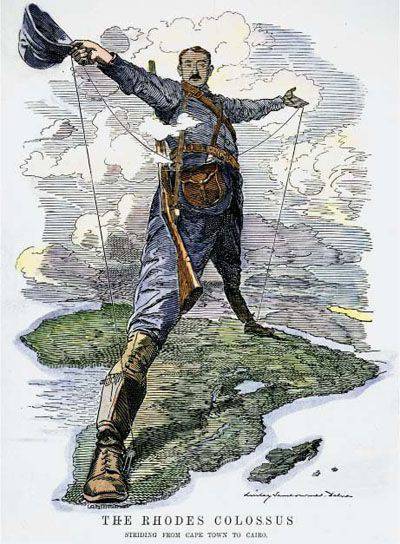
The British lion was no longer so frisky and quick as it was at the dawn of its hunting season, but it was still greedy and hungry. He clawed to all the nooks and crannies of his vast possessions, and then those who "carried this proud burden" walked into the jungle, mountains and savannahs. Yes, they themselves willingly went to where it was possible to give a large plural value to pound sterling with good luck and desire. In the last quarter of the 19th century, South Africa became a factory for knitting together states, intercepting the baton from already fairly exhausted India. The boosted growth of the British colonial empire in the Victorian era was achieved by the combined use of finance and weapons. One of those who used this recipe most productively was Cecil Rhodes, who added British stories fame, blood, calculating cynicism and diamonds. In 1870, the 17-year-old son of a clergyman from Bishop-Stortford emigrated to South Africa because he could no longer bear cold mutton. An ambitious young man, overwhelmed with not naive thoughts to put the whole world to the foot of the British throne, sought not only wealth. He dreamed of becoming an empire builder.
He probably would have become one of many whose bones gnawed by lions and hyenas would have remained dry in the African savannah if he had not had very profitable and useful acquaintances from the City of London. Among these helpful acquaintances was one most needed gentleman. Someone Lord Rothschild, the owner of "factories, newspapers, ships" and in the appendage of a huge banking empire. When Rhodes arrived at Kimberley’s diamond mines, more than a hundred different firms and firms were operating there, developing four main pipes and in the process of buying, selling and selling diamonds. In 1882, Agent Rothschild visited Kimberly and recommended Rhodes, who represented the interests of this banking house, to consolidate. The young man very carefully fulfilled the wishes of his patron from London - in four years there are only three companies left. And then all this diamond-mining enterprise was transformed into the impressive firm De Beers. Officially, it was owned by Rhodes, but in fact the main holder of the shares and, therefore, the "target designator" remained Rothschild.
Diamonds alone could not satisfy Rhodes' imperial ambitions. For the dynamic development of British expansion in southern Africa, he needed a powerful and at the same time flexible mechanism, generously smeared with full-pound sterling. And it was created. In 1889-1890, the “imperial visionary” and “baron-robber”, as he was called in certain circles, with the closest support of the Rothschild Bank, created the British South-African Company (BLAC), a joint-stock company whose goal was virtually monopoly exploration and exploitation of mineral resources , mining and, accordingly, the necessary territorial expansion. The company had its own flag and charter and had its own armed forces: mercenaries recruited from different parts of the British Empire. Rhodes, relying on the ever-increasing power of the company, had broad ideas. Not only the acquisition of land north of British South Africa, but also the strengthening of English rule on the continent through the construction of the trans-African railway Cairo-Cape Town and the same-name telegraph line. Such truly cyclopean plans had one very small snag on which noble gentlemen for the time being did not pay attention, like dust under their feet. In addition to them, the population of Africa itself had its own African, national opinion on British colonial policy.
local
On the territories of interest to Rhodes and his companions to the north of the then British possessions, where present Zimbabwe is located, at that time there lived the people of the Matabela Bantu people, who were at the stage of the tribal system. Of course, in comparison with civilized Englishmen who read the fascinating novels of Scott and Dickens in the intervals between the brisk devastation of Hindu temples and Chinese pagodas, the local population did not shine with culture. They were simple herders and could not hold the conversation about Shakespeare. Matabele did not resemble at all the adorable Stevenson babe-medovars whom the evil Scottish king came to exterminate. With the exception of one little thing - they lived on their own land. And they did not complain about those who began to challenge this right.
The rules of this people Inkosi (leader, military leader) Lobengula. He was an outstanding man who won the right to be called a leader in an internecine war after the death of his father. In 1870, Lobengula became the ruler of his people. For a long time, he managed diplomatically to restrain the expansion of the British, Portuguese and the Germans who appeared in 1880 in the territories between Zambezi and Limpopo. The smart leader didn’t appreciate the discovery of gold deposits in the Witwatersrand mountain range (in present-day South Africa) in 1886, and how important it is for the more and more whites. In February, using various methods, 1888 forced him to sign a “friendship” agreement with the British Empire, which was no more appropriate than the tiger’s promise not to hunt antelope, and at the end of the same year gave Cecil Rhodes the right to develop mineral concessions in his territory . Rhodes personally knew the leader - his doctor treated Lobengul for gout. There is no need to say that this agreement was beneficial only to one party - the British South-African company. Noble gentlemen promised their patronage to the Matabele people, suspiciously resembling the relations of fraterns and merchants in dashing 90.
In the wake of gold
Rhodes was in a hurry. The lands of Africa were rich, and those who wanted to try these riches were getting more and more. The German Kaiserreich set about building his own colonial empire, the French were jealously following the success of the British, the Portuguese turned around in Mozambique. There were persistent rumors, by the way, not justified, about the possible appearance of Russians on the Black Continent. Rhodes did not experience any illusions about the Matabele, as the host, who suggests order in the house, for the time being suffers from the presence of flies in it. Lobengula was no more than a step, which he had to step on in order to climb the stairs of the construction of the colonial system. In a letter to his companion, patron and just a rich man, Sir Rothschild Rhodes called the leader "the only obstacle in Central Africa" and argued that as soon as "we capture his territory, the rest will not be difficult."
It should be noted that in the inevitable perspective conflict, for which it was necessary only to choose a convenient time and place, the energetic empire builder did not need to turn to the colonial administration to provide soldiers. The British South African company was rich enough to have and maintain its own armed forces, consisting of a contingent that was abundant at that time in places rich in gold - adventurers, desperate people. To put it in modern terminology, it was a hybrid of a business consortium and a private military corporation.
Rightly believing that the contract signed with Lobengula is as shaky and fragile as the chair in a cheap London pub under a spirited drunkard, Rhodes is taking steps to strengthen the British presence in Matabeleland. He decided to send there a group of colonists who were to occupy certain parcels of land and establish settlements there. The fact that these territories are controlled by Lobengula was no more than a small misunderstanding. For the upcoming operation, which went down in history as the "Column of Pioneers", Rhodes threw a cry in order to attract volunteers. Those who wish to go to the land where, according to rumors, it was full of gold, was enough - about two thousand people, of whom Rhodes rejected more than half as people from wealthy families. The fact is that he was afraid of excessive noise that could arise if suddenly "friend" Lobengula was outraged because of an unauthorized resettlement and his soldiers would have shot down some local "major". Each colonist was promised a plot of land in 3000 acres (12 sq. Km.). Finally, 28 June 1890, a column of 180 civilian colonists, 62 vans, 200 armed volunteers, left Bechwalend. Led column 23-year-old adventurer Frank Johnson (in Africa grew up quickly). Frederick Selus, who had already become legendary, and who became the prototype of Allan Quarteimen in the novels of Henry Haggard, participated in the operation as a conductor. A little later some more colonists joined the column. Having passed more than 650 km, they finally reached a flat marshy meadow with a rocky hill. Here 12 September 1890 was solemnly raised the flag of the United Kingdom. This is where the city of Salisbury (Harare), the capital of future Rhodesia, will appear. This day will be the national holiday of Rhodesia. One of the most effective special forces in the world will be named after Selous - the legendary Rhodesian "Scouts of Selous".
Lobengula, who was, to put it mildly, at a loss on how easily white people roam across his lands and establish fortified settlements, began to "suspect something." The leader was not a fool and primitive savage, as the natives used to think in the fashionable salons of the United Kingdom. He understood that a collision with white aliens was a matter of time. To express his bewilderment, Lobengula had impressive capabilities: 8 thousand infantry, mainly spearmen, and 2 thousand shooters, some of which were armed with a modern at that time Martini-Peabody caliber 11.43 mm. Lobengula kept pace with the times, believing that it would be difficult to fight with whites with cold weapons. However, a large number of shooters in the Matabele army was leveled by their low rifle training, inability to fire volleys and sighting.
And white people, sly and curious about fabrications, also had something in their sleeve.
New technologies - new weapons
In 1873, the American inventor Hiram Stevens Maxim invented a kind of device, which he called a machine gun. This was the first model of automatic small arms. Invented and ... put it on 10 for years, since Maxim was a versatile person and was interested in many things. Subsequently, having made some changes in the design, the inventor tried to attract the attention of the US government to his product, but it remained indifferent to the machine gun. Maxim moved to England, where he again modernized his brainchild in the workshop in Hatton Garden, after which he sent invitations to many influential persons for his presentation. Among those who accepted the invitation were the Duke of Cambridge (then Glacier), the Prince of Wales, the Duke of Edinburgh, the Duke of Devonshire, the Duke of Southland and the Duke of Kent. As well as some other impressive gentlemen, among whom Baron Nathan Rothschild tapped a reed modestly.
Appreciating the contraption that spewed an avalanche of lead, distinguished guests, however, expressed some doubt about its usefulness. “You should not buy it right now,” the Duke of Cambridge expressed his general opinion. The military are conservative people. Here are some domestic "historians" attribute the scarcity of thinking and clubbing exclusively to the Russian and Soviet generals. The fact that in other countries the same thing happened when taking the latest weapons: the British disdained machine guns, their colleagues from the Admiralty disdain submarines, the Prussian military bone scorned contemptuously, seeing the drawings of the first tanks, - Democratic researchers prefer not to notice.
But, while the big lords thoughtfully pulled their beards, Baron Rothschild instantly appreciated the merits of Maxim's invention. He provided him with funding and in 1884 the year when Maxim’s company was founded, Rothschild became one of its managers. In a machine gun, this know-how of killing science, he saw an excellent means for countering African tribes, who were accustomed to operating in tight military formations.
Shotguns and assegai
The situation in Africa spun up. At the beginning, both Lobengula and Rhodes, each from his own side, tried not to aggravate the situation. The leader Matabele, knowing the effectiveness of White’s weapons and, obviously, wanting to be better prepared, the entire 1891 and 1892 years abstained from any hostile actions against the white settlers. Rhodes wanted the pioneers to settle more closely in new places, take roots. An unstable balance persisted until 1893, until the leader of one of the vassal Lobengule tribes, located in the area of the newly founded Fort Victoria, refused to pay tribute to his overlord. Vassal believed that since he lives next to the settlers, he is under the protection of their white law, therefore, no tribute is needed to pay the “center”. Lobengul could not bear such frank disobedience and “separatism” - the question of his reputation was at stake, and in Africa it was an irreplaceable resource. It was extracted by personal participation in battles and wise rule, and was lost very quickly. In July, the 1893 of the year, the Inkosi sends a detachment of several thousand people to deal with the focus of disobedience in the state. The village, which fell into all sorts of liberties, was occupied by the Matabela soldiers and brought to obedience. Now the question was in the prestige of the white man - whether his word has weight or not. And any word is well weighted not only with gold, but also with lead and steel. Representatives of the British South-African company in a tough form demanded that the Matabele should clear the occupied village. The request was rejected. In the ensuing exchange of fire, a number of soldiers were killed, the rest left the captured village. Now Maxim's machine gun had to perform his debut solo.
Both sides spent the whole of August and September in preparations. This time, the active Rhodes, who was then Prime Minister of the Cape Colony, and his assistant, Linder Jameson, spent collecting and equipping the expeditionary force. The British could put about 750 people from the composition of the so-called South African police, who are financed by BUAC, and a certain number of volunteers from the local population. In his enterprise, Rhodes could also count on the help of warriors of the Bamanhvato tribe of the Tswana people, who had their own local accounts with Lobengula.
October 16 The 1893 of the year the English made the main forces of 700 a man under the command of Major Patrick Forbes, accompanied by a large wagon train. As a means of fire reinforcement, the detachment had five Maxim machine guns (thanks to Baron Rothschild), one clearly inferior to them, the double-barreled Gardner machine gun, and also the Hotchkiss 42-mm mountain cannon. The company's plan was fairly simple. A quick march to go to the capital Lobenguly - Bulawayo, in fact, a large village. Despite the immense numerical superiority of the natives, the British felt confident enough due to the overwhelming firepower and, naturally, the fact that they were the British and “God, the Queen and England” behind them.
Lobengula also did not doubt the intentions of the enemy and decided to stop their advance with a preemptive strike - to carry out the attack on the march.
October 26 near the river Shangani Matabele made the first attempt to attack the British forces, estimated by Forbes in the amount of at least 3 thousand people. Armed mainly with edged weapons, the natives attacked with a dense mass, trying to reach the length of a spear throw. Machine guns were successfully applied to the attackers: having lost approximately 1 thousand soldiers, they retreated. White lost only a few people killed.
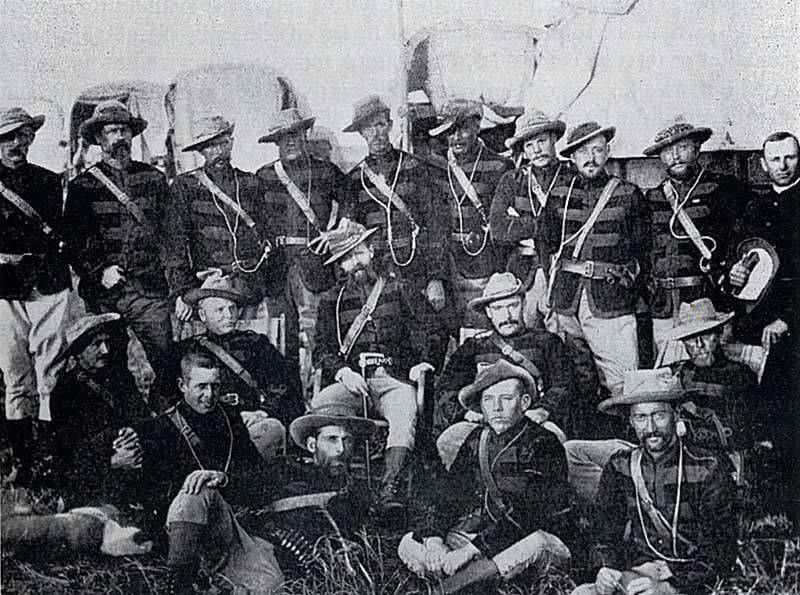
A larger collision occurred in an open area in the area of the Bembesi River 1 in November 1893, when more impressive forces were attracted to attack the British: 2 thousand riflemen and 4 thousand spearmen. Unfortunately for the natives, they had little idea what a classic wagenburg was, besides, assembled from large heavy vans. Intelligence time reported to Forbes that the enemy was approaching, and the column took up a defensive position inside the perimeter formed by the wagons. The most experienced warriors of the younger leaders Imbezu and Inguba were the first to attack. And again, the natives did not follow the special tactics and attacked a large unorganized crowd. The guns, which were in abundance with them, they used extremely illiterate - the British rated their shooting as chaotic. A lively wave of Matabele was met by a dense and accurate fire of English soldiers and volunteers, of which there were about 700 in the camp. In the center of positions were established "Maxims", which brought down an avalanche of lead attacking. Such technological weapons in the ranks of the enemy present devastation - the best warriors dozens fell to the ground, slain by machine guns. According to an English-speaking eyewitness, they "entrusted their fate to Providence and Maxim's machine gun." The attack of the Africans was expectedly choked, the selective troops were actually defeated. It is estimated by the British, there were about 2500 killed natives in front of the vagenburg. The main forces, watching the battle from the ambush, did not dare to enter the battle. White's own losses can be characterized as trifling against damage to the enemy - four dead. Baron Rothschild extremely profitable invested money. The London "Times", not without malice, noted that the paper "is credited with our victory to witchcraft, believing" Maxim "to be the product of evil spirits. They call him “skokakoka”, due to the specific noise that he makes during the shooting. ”
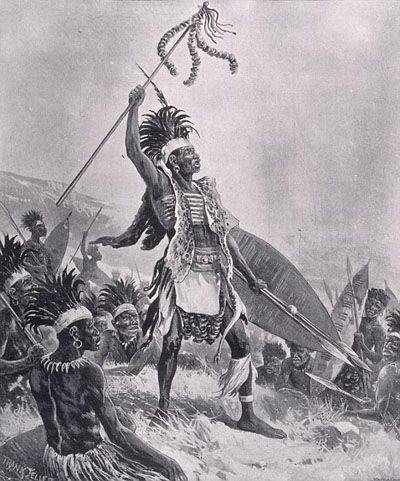
After putting himself in order after the battle, to which the word slaughter is more applicable, the British command decided to accelerate in the direction of the capital Matabele, rightly deciding that its capture and the possible capture of Lobengula itself would speed up the denouement. From the west to Bulaway, loyal to the British, the Bamanhwato in the number of 700 warriors under the command of Khama III, who in 1885, asked for protection from the whites, moved forward. As once in America, the politics of beads and whiskey bore fruit. The British skillfully manipulated the tribes of Africans, using them for their own purposes, as they did with the Indians.
Upon learning of the defeat of Bembezi, Lobengula decides to leave his capital. The fire superiority of the British and the huge losses in manpower - the exchange of one Englishman for a thousand of his soldiers - did not in the best way affected the leader. He set fire to and partially destroyed Bulawayo, which for the most part consisted of mud huts. An ammunition depot was blown up; all food depots were also destroyed. November 2, a horse-led reconnaissance led by Selus, found the city ravaged and abandoned. 3 November the main forces of the British entered the capital Matabele.
Lobengula retreated with the remnants of his army to the Zambezi River. At this stage of the conflict, the “gentlemen” decided to play the nobility and sent the chief a few courteous messages with a proposal to return to Bulawayo, that is, to actually surrender. But Lobengula knew too well what Rhodes and his company were capable of, and did not believe them.
Having failed in the diplomatic field, 13 November Forbes gave the order to start the persecution of Lobengula, which was greatly complicated by bad weather conditions and difficult terrain. For a long time it was not possible to detect the main forces of the Matabele. 3 December 1893, the year Forbes camped on the south bank of the Shangani River, 40 km from the village of Lupane. The next day, Major Allan Wilson's squad from a dozen scouts crossed to the other side. Thus began an event that entered the British and Rhodesian colonial history as “Shangani watch”. Wilson soon met the women and children of the Matabele, who told him where the king was supposed to be. Frederick Burham, a scout from the Wilson squad, advised the major not to believe this information, believing that they were being lured into a trap. However, Wilson ordered a move on. Soon they really discovered the main forces of the natives. A request for help was sent to Forbes, but he did not dare at night to force the river with all his might, but sent Captain Henry Borrow with 20 people to reinforce intelligence. At dawn, this handful of Englishmen was surrounded by several thousand warriors under the command of Brother King Gandang. Wilson managed to send three people from among his scouts to Forbes for help, but after crossing the river and reaching the camp, they again found themselves in battle, as the Matabele organized an attack on the main forces of the British. Scout Berchem, not without reason, told Forbes, "that they are the last survivors from that shore." The events that occurred on the north side of the river were able to be fully restored only after some time, since none of the British 32 from the Wilson squad survived.
Patrol Shangani
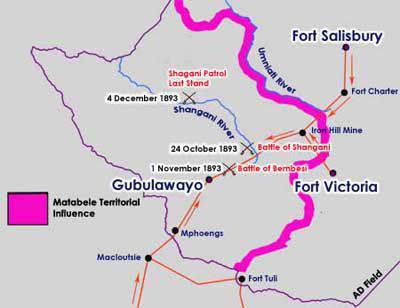
Wilson's squad took a position in an open area, having in front of him a well shot through space. Boxes of cartridges, horses, and then their bodies were used as shelters. Publishing piercing battle cries, encouraging themselves with the drums of war, they attacked time and again with the Matabele, and, bearing losses, they rolled away. Gandang very much wanted to present a victory to his royal brother, which would be a bright spot against the background of previous crushing defeats. Even not very accurate fire of Africans caused damage - after each attack the number of wounded and killed among the British grew. The level of the Shangani river rose, and it was no longer possible to send reinforcements to the perishing detachment, moreover, the main column of the British was connected by combat. By the second half of the day, Wounded Wounded survived, who continued to fire with Scottish composure. Several of his wounded comrades loaded guns for him. Finally, when the ammunition was completely used up, the British, relying on guns, rose and sang "God Save the Queen," until they were actually finished. The sons of Britain in the 19th century, who firmly believed that they carried the light of enlightenment to wild tribes with the bayonets and machine guns of Maxim, were capable of such actions. And Wilson and his people had no personal courage. True, they heroically perished, not reflecting the landing of the enemy on Misty Albion, but in a colonial war against a people who defended their land.
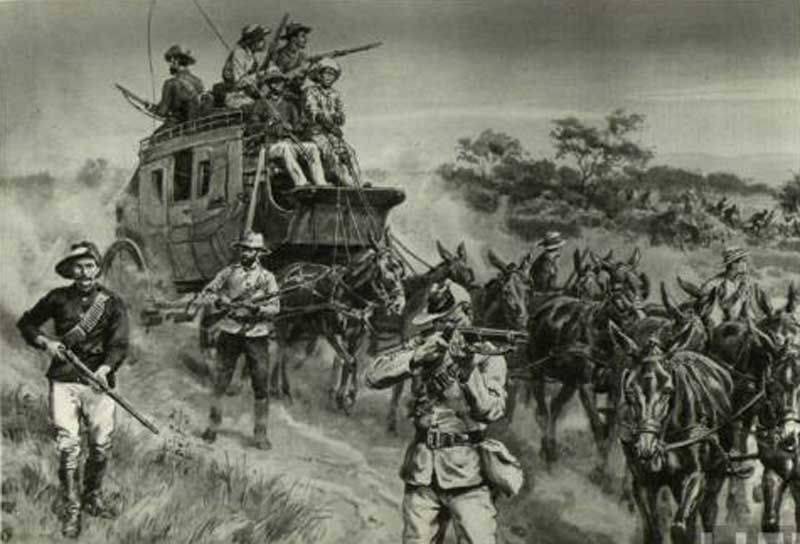
The private success of the Matabele at Shangani could not seriously affect the entire course of the conflict. The natives moved deeper and deeper into their territory. In January 1894, under rather mysterious circumstances, Lobengula died. Perhaps the top of the tribe, set up "in a constructive dialogue with English partners," just got rid of his king. After the death of the leader, negotiations began between the South African company and the leaders (from Indus) Matabele. The company received the entire Motabelend in management, confirmed by royal decree. In the House of Commons, some political forces tried to condemn the BUAC, accusing it of deliberately provoking a war. Such parliamentary rallies were not at all caused by philanthropic sympathy for the “poor natives”, but by the usual quarrels between the Laborites and the conservatives. However, Rhodes everywhere had his own people, and his friend, the minister of the colonies, the Marquis of Ripon, turned the matter towards justifying the actions of the ACCAC and its rehabilitation.
True, during the investigation some curious details were found out. A few days before the tragedy at Shangani, Major Forbes sent Lobengule another letter with a proposal to admit his mistakes, return to Bulawayo, and forgive him everything (well, almost all). Forbes did not wait for an answer. It turned out that the leader still sent a response letter of conciliatory content along with bags of golden sand, the value of which was determined in more than 1 thousand pounds, with two messengers. Obviously, reeling through the jungle, no longer young Lobengula was tired of nomadic life and was ready for negotiations. The messengers handed over letters and gold to two soldiers of the advanced patrol of the British, who, after consulting, decided to keep the gold for themselves. Because of this, hostilities continued. Both combinators received 14 years of hard labor, but, however, were released after several months of imprisonment.
Trail of a white man
The colonial policies of Britain in Africa are replete with conflicts and wars. Neither the government, nor public opinion, nor those who personally embodied the ambitions of London among the savannas and the jungle, doubted the correctness of their actions. Domestic "democratic historians", sticking out languages from their efforts, assertively criticizing Russia and the USSR, accusing them of colonialism and imperial ambitions, obviously do not notice from pure absentmindedness on which mountains of bones and rivers of blood the "educated navigators" built their empires. Cecile Rhodes died in 1902, near Cape Town, and was buried there. The British colony of Southern Rhodesia was named after him, whose history requires a separate article. In the colonial wars and the advancement of the white man into the depths of unexplored spots on the map, English youth and elite were cultivated. In many ways, it was a misanthropic ideology that prioritizes the interests of the "British race." This policy forged Rhodes and others like him - fearless, deeply cynical, self-righteous individuals - who did not make the difference between killing a Bengal tiger and a Zulu warrior, since they sincerely believed that they were just different types of wild animals. For the elite of Britain, born on the fields of Hastings, matured in the Crusades and on the blood of Azenkur and Crecy, moved to the bridges of pirate ships, and later found a place among those who made their way through the mountains, jungles and deserts, the interests of their own country were first place. And these interests were fueled by ambition, greed, a sense of superiority and cruelty. It must not be forgotten that other peoples and countries mentioned by gentlemen were seen as interfering with these interests, which extend far beyond the limits of the island of Great Britain. And they have not changed their interests. Still.
Information